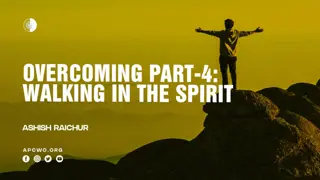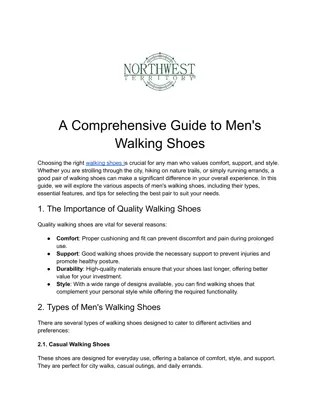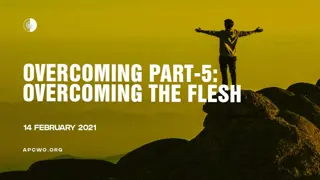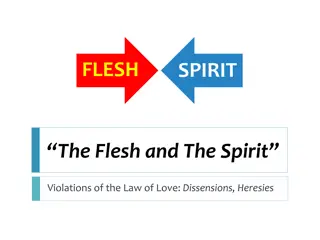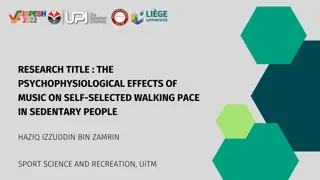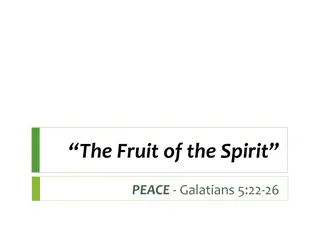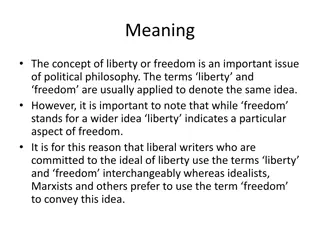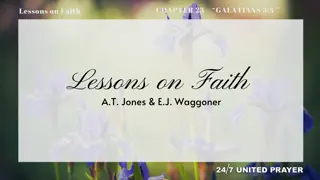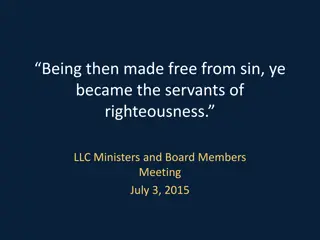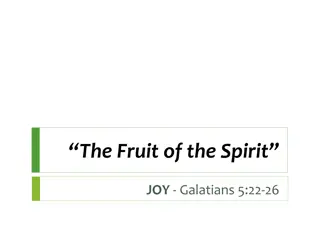Walking in Freedom: A Study on Galatians
Understanding the importance of walking in freedom as discussed in the book of Galatians. Paul emphasizes the balance between liberty in Christ and serving one another in love, cautioning against indulging the flesh. The theme of standing fast in the liberty provided by Christ runs as a central message throughout the letter, highlighting the need to walk in the Spirit to avoid fulfilling the lust of the flesh.
Download Presentation

Please find below an Image/Link to download the presentation.
The content on the website is provided AS IS for your information and personal use only. It may not be sold, licensed, or shared on other websites without obtaining consent from the author.If you encounter any issues during the download, it is possible that the publisher has removed the file from their server.
You are allowed to download the files provided on this website for personal or commercial use, subject to the condition that they are used lawfully. All files are the property of their respective owners.
The content on the website is provided AS IS for your information and personal use only. It may not be sold, licensed, or shared on other websites without obtaining consent from the author.
E N D
Presentation Transcript
Learning to Walk in Freedom Learning to Walk in Freedom 5:13 5:13 26 26 Week 12 Week 12 6 April 2022 6 April 2022
GALATIANS Overview In chapter five, Paul reaches the climax of this epistle, by stating what can properly be called the theme of the letter: Stand fast therefore in the liberty by which Christ has made us free, and do not be entangled again with a yoke of bondage. Paul does not want anyone to think that liberty in Christ means license, and encourages them to use their liberty in order to serve one another in love. The two-fold benefit of this proper use of liberty is that one actually fulfills the Law, and at the same time does not give the flesh an opportunity to cause them to bite and devour one another (5:13-15).
GALATIANS Overview Paul then stresses the need for the Christian to walk in the Spirit so as not to fulfill the lust of the flesh. He describes the enmity between the flesh and the Spirit, explaining why we must bear the fruit of the Spirit instead practicing the works of the flesh (5:16-23). Not only is there no inheritance in the kingdom of God for those engaging in the works of the flesh, but those in Christ have crucified the flesh with its passions and desires. Having been made alive in the Spirit, they ought to walk in the Spirit so as not to be conceited, not provoking nor envying one another (5:24-26).
GALATIANS Introduction We tend to view freedom as something akin to 007 s license to kill. If anything we do is covered by the grace of God, we might as well embrace that liberty and live life to the max! We can cast off all restrictions and go hog wild. And we won t let anybody tell us what to do ever. Swindoll: If you think that philosophy of life results in freedom, you haven t spent fifty-plus years in pastoral ministry. Over and over again, I ve seen that kind of licentious living enslave people in the consequences of their sinful and foolish choice.. Sometimes the effects are so extreme that they scar people for life. Trust me. The just do it approach to life isn t freedom; it s just another form of bondage.
GALATIANS Introduction We ve seen Paul react strongly against the error of legalism. Now, in Galatians 5:13-26, he corrects the other extreme license. As we will see, the balancing act between living under the Law and living lawlessly requires great wisdom, restraint, and, most importantly, the enabling power of the Holy Spirit.
GALATIANS 5:13 15 13You, my brothers and sisters, were called to be free. But do not use your freedom to indulge the flesh; rather, serve one another humbly in love. 14For the entire law is fulfilled in keeping this one command: Love your neighbor as yourself. 15If you bite and devour each other, watch out or you will be destroyed by each other.
GALATIANS 5:13 15 Christ s death and resurrection set us free. Most believers understand this, at least to some extent. Far too many, however, have come to terms with what they are freed from but not what they are freed for. We weren t release like birds from a cage to flutter wherever we want. Nor were we freed from a dungeon to spend the rest of our days in a different jail with a few more amenities. Our freedom in Christ is truefreedom, but it s freedom with a purpose. Christ has unlocked the prison door, unshackled us, taken us by the hand, and led us to follow Him. He has freed us from condemnation so that we re now able to obey Him.
GALATIANS 5:13 15 To help us better understand freedom, let s reflect on what we are freed from and what we are freed for . . .
GALATIANS 5:13 15 God has grand purposes for us when He frees us from our former life of sin and releases us to a new life of righteousness. Too quickly, however, we forget what true freedom is, falling back on worldly ideas of freedom. Because of our tendency to forget what we are freed from and what we are feed for, Paul makes things perfectly clear in Galatians 5:13-15. Though the Galatians had been called to freedom, it wasn t of grace ; the kind of freedom of which the Judaizers accused Paul and his fellow preachers of preaching. Like legalists today, the Judaizers feared that without the Law as a rule of life, people would become lawless.
GALATIANS 5:13 15 Paul responds by reminding the Galatians that Christian freedom is not a license to indulge the selfish and sinful desires of the flesh. Paul warns his readers against giving our flesh our natural tendency toward sin an opportunity by abusing our freedom. The Greek word translated opportunity is referring to a pretext. That is, God s grace should never be used as an excuse for sin. Again, the grace of God should never be used as an excuse for succumbing to temptation and sin. Paul says that we have been freed from the power of sin. To return to the sinful lifestyle that God has forgiven would be to return to slavery. Instead, having been freed from the dark, shameful oppression of sin, we are to embrace our true calling to serve one another through love (5:13).
GALATIANS 5:13 15 Liberty should result in love, not legalism or license . . . Serving others out of love frees us from our own self- centeredness. It humbles our pride. It has the power to transform us into the image of Jesus Christ.
GALATIANS 5:13 15 Love brings us into the fullness of God s purpose for our lives. In fact, love itself transcends the dos and don ts of law, rendering them irrelevant. Love also limits our natural tendencies to sin, rendering them impotent. By living a life of service through love, we avoid legalism and license. This is why Paul can say in 5:14, For the whole Law is fulfilled in one word, in the statement, You shall love your neighbor as yourself. So simple, so basic . . . yet so easily forgotten! The idea of loving one s neighbor self- sacrificially is so foundational that the above quotation from Leviticus 19:18 shows up all over the New Testament. Jesus says that besides the commandments to love God with all our being, this is the greatest commandment (Mk 12:31).
GALATIANS 5:13 15 James calls it the royal law (James 2:8). Similarly, the apostle John emphasizes the need not only to love God but to love one s brother also (1John 4:21). In his letter to the Romans, Paul says that every command of the OT Law is summed up in this saying, You shall love your neighbor as yourself (Romans 13:9). The love Paul has in mind isn t a wishy-washy kind of affection based on fleeting emotions. Nor is it the kind of love that looks for love in return. The love Paul speaks about is the love God demonstrated when He gave His Son for us (John 3:16). This agape love gives and keeps on giving, even when it receives nothing in return.
GALATIANS 5:13 15 Finally, Paul warns against living self-indulgent, self- serving, and self-centered lives lives characterized by the opposite of agape love. If we exploit others and disregard their needs, we will reduce the entire church to clawing competition and cutting criticism (5:15). We will consume each other until nothing remains but picked-over bones. What a horrible picture Paul paints of life lived according to the flesh!
GALATIANS 5:16 18 16So I say, walk by the Spirit, and you will not gratify the desires of the flesh. 17For the flesh desires what is contrary to the Spirit, and the Spirit what is contrary to the flesh. They are in conflict with each other, so that you are not to do whatever you want. 18But if you are led by the Spirit, you are not under the law.
GALATIANS 5:16 18 We have seen that true Christian liberty is a balancing act between legalism and license. The answer to legalism is that the death of Christ set us free from the oppressive and pervasive mandates of the Law. The answer to license is that the Holy Spirit is able to set us free from the oppressive and persuasive desires of the flesh. In Galatians 5:16-18, Paul exposes the gritty warfare that rages between our desperately wicked, sinful tendency toward unrighteousness and the Holy Spirit s work to woo us in the way of obedience and righteousness.
GALATIANS 5:16 18 The person we used to be without Christ (the flesh) still tries to gain a foothold in our new life and trip us up. The old nature tempts us to indulge in the old ways or trust in the old means instead of allowing the Holy Spirit to take control. We re free in Christ, but the flesh constantly challenges that freedom. To grow in Christ, then, we must take deliberate action against the relentless demands of the flesh. The phrase walk by the Spirit in 5:16 is another way of saying, live by the Spirit or let your conduct be directed by the Spirit. The issue is control. The solution is surrender. Our sinful desires and the desires of the Holy Spirit are forever at odds with each other. Actually, it s more like an internal war.
GALATIANS 5:16 18 When we live by the power of the Spirit, we will not indulge the flesh. When we indulge the flesh, we are not living under the control of the Spirit (5:16-17). The great Protestant Reformer John Calvin put this well: The spiritual life will not be maintained without a struggle. Disobedience and rebellion against the Spirit of God pervade the whole nature of man. If we would obey the Spirit, we must labor, and fight, and apply our utmost energy; and we must begin with self-denial. Small wonder that Jesus, when describing how His followers are to come after Him, stated first that we must deny ourselves (Luke 9:23).
GALATIANS 5:16 18 The all-out war between the Spirit of God and our sinful flesh is unrelenting in this life. The two are opponents, enemies, unrelenting combatants. So fierce is the battle that the flesh keeps us from doing the things that we genuinely want to do to please God (5:17). Many Christians doubt the assurance of their salvation because of this unending struggle within us. If that s you, stop doubting! The fact that you even care about the struggle is a sign that the Spirit is working in you both to will and to work for His good pleasure (Phil 2:13). If the Spirit of God was not fighting this battle on your behalf, you wouldn t care one bit about struggling against sin.
GALATIANS 5:16 18 Paul s words about the war between the Spirit and the flesh are directed against our tendency to slip off balance into license. But he also deals with the other extreme the Law. How easy it is to respond to the flesh by retreating into legalism! How often we interpret the Spirit working in us to will and to work as our own conscience pushing us to obey external rules and regulations. Paul reminds us that being led by the Spirit means being transformed from the inside out, which results in both attitudes and actions that transcend the Law: If you are led by the Spirit, you are not under the Law (5:18).
GALATIANS 5:19 23 19The acts of the flesh are obvious: sexual immorality, impurity and debauchery; 20idolatry and witchcraft; hatred, discord, jealousy, fits of rage, selfish ambition, dissensions, factions 21and envy; drunkenness, orgies, and the like. I warn you, as I did before, that those who live like this will not inherit the kingdom of God. 22But the fruit of the Spirit is love, joy, peace, forbearance, kindness, goodness, faithfulness, 23gentleness and self- control. Against such things there is no law.
GALATIANS 5:19 23 Paul now sets before us two sharply contrasting pictures, like two military forces on opposite sides of a battlefield. On one side are the deeds of the flesh (5:19- 21) and on the other, the fruit of the Spirit (5:22-23).
GALATIANS 5:19 23 Notice that the list of the deeds of the flesh is longer than the list of the fruit of the Spirit. Paul gives fifteen concrete examples of the deeds of the flesh, concluding with the phrase and the like (5:21). He could easily have listed more. We won t take time to examine each word in the list. That wasn t Paul s intention. His purpose was to paint a dreadful overview of various lifestyles steeped in sin. Four major subjects appear in Paul s sin list: 1] SEXUAL SIN 2] RELIGIOUS SIN 4] PERSONAL SIN 3] SOCIAL SIN
GALATIANS 5:19 23 SEXUAL SIN: This includes things like uncontrolled lust, adultery, fornication, homosexual practice, prostitution, and pornography. RELIGIOUS SIN: This includes such things as occult involvement, false religions, New Age spirituality, superstition, and idolatrous materialism. SOCIAL SIN: this includes things that are destructive to our families, churches, and communities, such as slander, gossip, harboring bitterness, bearing grudges, road rage, refusing to forgive, and physical or verbal abuse. PERSONAL SIN:This include sins against one s own body, such as drug addiction, workaholism, alcoholism, barhopping, gluttony , and other self-destructive behavior.
GALATIANS 5:19 23 Paul says that people who practice these deeds of the flesh will not inherit the kingdom of God (5:21). Does Paul mean that true believers who get entrapped in some of these sins will lose their salvation? Certainly not! Christ died for all of our sins past, present, and future. No Christian is sinless. Every one of us struggles on a daily basis with deeds contained in Paul s ugly sin list. Paul means that those whose lifestyles continually demonstrate indulgence in the deeds of the flesh do not have the Spirit of God. Those who don t have the Spirit of God do not have eternal life. He s not talking about the saint who has a problem with jealousy, or the father who has a temper, or the working mother who becomes hooked on prescription drugs.
GALATIANS 5:19 23 Paul is talking about people who abandon themselves to a lifestyle habitually dominated by these deeds. Paul didn t mean for his list of dirty deeds to become a checklist for determining whether a person is saved or not. If any of us were to be caught on a bad day, week, or month, we would all fail such a test and be judged by others as outside the kingdom of God. Rather, Paul s point is that because these lifestyles of sin typify those who do not know Christ, we who do have a relationship with God should be eager to avoid such practices! And we are not just to avoid the bad: those who have the Spirit should display quite a different set of characteristics, the fruit of the Spirit (5:22-23).
GALATIANS 5:19 23 Paul doesn t call these good works the deeds of the Spirit, but the singular fruit of the Spirit. The singular form stresses that these qualities are a unity, like a bunch of grapes instead of separate pieces of fruit, and also that they are all to be found in all Christians. In this they differ from the gifts of the Spirit, which are given one by one to different people as the church has need. These qualities of the Christian walking by the power of the Holy Spirit flow together from a heart indwelled by the Spirit of God.
GALATIANS 5:19 23 Life in the Spirit means life controlled by the Spirit in every area, from our innermost attitudes and emotions to our outermost relationships and responsibilities. Against the fruit of the Spirit, there is no law (5:23). In other words, the Law cannot condemn us when we live by the Spirit. Nor do we need to keep looking up the rules and regulations for every situation when we handle each moment of life with these virtues.
GALATIANS 5:24 26 24Those who belong to Christ Jesus have crucified the flesh with its passions and desires. 25Since we live by the Spirit, let us keep in step with the Spirit. 26Let us not become conceited, provoking and envying each other.
GALATIANS 5:24 26 All this talk about the fruit of the Spirit leads to a natural question: How? How do we walk in the Spirit? How do we keep the flesh from getting a foothold? How do we live a life that consistently reflects the goodness of God? Paul addresses these questions when he reminds us that those who belong to Christ (all believers) have put the flesh to death along with its passions and desires (5:24). This is a past reality. Our old nature was crucified with Christ, nailed to the cross with Him (Romans 6:6). As Paul said a few chapters earlier, I have been crucified with Christ; and it is no longer I who live, but Christ lives in me (Gal 2:20).
GALATIANS 5:24 26 In other words, the moment we first believed, the Holy Spirit baptized us into the body of Christ, exchanging our sin for Christ s righteousness. The Spirit also comes to dwell in us, permanently cleansing us from sin, uniting us with Christ, and sealing us with the promise of future redemption. We have been made alive together with Christ (Eph 2:5). So, because we live by the Spirit of God, we should also walk by the Spirit of God (5:25). This means choosing to change and continuously following through on that commitment, knowing that the willingness and the ability comes not from us, but from Christ (Phil 2:13).
GALATIANS 5:24 26 Therefore . . . Consciously, consistently, and courageously say no to sin. Repeatedly remind yourself of who you are in Christ. Pursue His will, desires, and calling, no matter the cost. Forsake your own weaknesses and depend on His strength. Having experienced the Savior s liberating touch, we must recall what we were freed from and embrace what we were freed for. Like the woman caught in adultery, freed from condemnation and the curse of the Law, we must heed Christ s exhortation: Go. From now on sin no more (John 8:11).
NEXT CLASS 13 April 2022 Before next class, read the below verses in the Before next class, read the below verses in the KJV and the NIV, plus one additional versions KJV and the NIV, plus one additional versions of the Bible, i.e., NRSV, NLT, NKJV, etc of the Bible, i.e., NRSV, NLT, NKJV, etc Chapter 5:26 6:10 Living Together in the Spirit EBC Website for Handouts EBC Website for Handouts https://bit.ly/surveyofpaulineepistles







